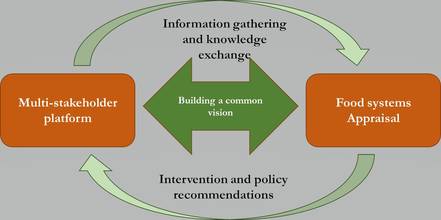How we work

Programmes implement the CRFS approach in pilot cities by involving a formal engagement of all relevant stakeholders across the entire duration of the process.
The CRFS process aims to help strengthen the understanding of the current functioning and performance of a city region food system, within which rural and urban areas and communities are directly linked. It forms the basis for further development of policies and programmes to promote the sustainability and resilience of CRFS. The process includes the following steps:
- Define and map your city region;
- Collect data on your city region food system;
- Gather and analyse information on different CRFS components and sustainability dimensions through both rapid and in-depth assessments;
- Use a multi-stakeholder process to engage policymakers and other stakeholders in the design of more sustainable and resilient city region food systems.
A CRFS process can result, not only in revised or new urban food policies, strategies and projects, but also in the creation of new -or revitalization of existing- networks for food governance and policy development, such as urban food policy councils and in new institutional food programmes and policies.
Discover more about the tools used in this process in the “Toolkit” part.

